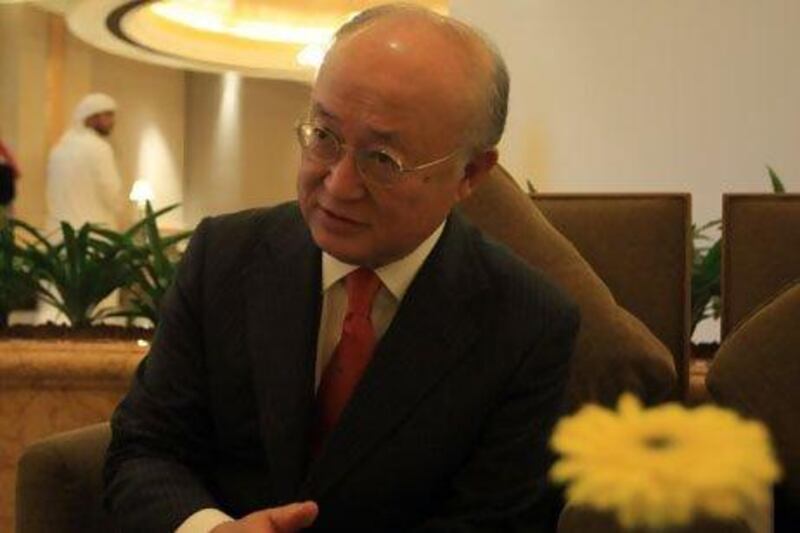The head of the International Atomic Energy Agency (IAEA) said he was "impressed" with the progress of Abu Dhabi's nuclear plans and urged the UAE to share its experience with other nations, during a visit to the emirate to discuss matters including Iran's programme.
Yukiya Amano, the director general of the United Nations nuclear watchdog, flew to Abu Dhabi's Baraka construction site 300 kilometres west of the capital, where concrete is being poured for a US$20 billion (Dh73.46bn) power plant scheduled to come online in four years. The UAE's nuclear programme is symbolic for the industry as the first in the Arab world and the first new nuclear programme to be launched since the 1986 Chernobyl disaster.
"It is on schedule or even a little bit ahead of the schedule - this is very rare," he said. "It will be a good example for other countries."
He praised the UAE for cooperating with the IAEA and its non-proliferation policy. The UAE gave up the right to enrichment or reprocessing in a 2009 treaty with the United States.
Mr Amano, who came from meetings with leaders in Saudi Arabia over its civil nuclear plans, called on the UAE to share the experience it would gain over the years with other nations, including in using nuclear technology in fields such as cancer therapy and agricultural development.
"The UAE is now in the process of constructing a new reactor, but it is not the end," he said. "Safe operation is needed, preparation for emergencies is needed and down the road you need to address the waste issue. Embarking on nuclear power generation means a very extensive, long-term commitment."
Mr Amano toured the construction site at Baraka, where construction is under way on the first of four planned reactors, and later met with Sheikh Abdullah bin Zayed, Minister of Foreign Affairs, to discuss ways the UAE could share its nuclear expertise.
They also discussed Iran, which is scheduled on February 13 to hold its next round of talks with the IAEA over the scope of an investigation into whether its programme has military purposes.
"We do not know if Iran has delayed [negotiations] and therefore we cannot tell if every activity, every material is for peaceful purposes or not," said Mr Amano. "Our legs, hands should not be bound too much. In that case we cannot do verification, and that is not in the interest of Iran or the international community."
The IAEA negotiationsare progressing on a parallel track to talks between Iran and six world powers - the United States, United Kingdom, France, Germany, Russia and China.
"At this stage we are at a very important moment for the future," said Mr Amano. "I'm neither optimistic nor pessimistic because this is a very complicated negotiation. It has taken too long to come to agreement - still we are not yet at that point.
"Dialogue is not for the sake of dialogue."
Safety concerns for local residents have been raised after a reported explosion last week at Fordow, Iran's underground enrichment facility. Centrifuges at Fordow were enriching uranium to 20 per cent, rather than the 3.5 per cent required to generate nuclear power. Iran has denied that any explosion took place.
"We have asked Iran to clarify the issue," said Mr Amano. "We do not know if the reported accident took place or not."





